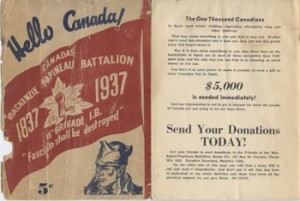Mac-Paps article spurs controversy in Canada
 An article last month about the fate of veterans who fought with the Mackenzie-Papineau Battalion by Canadian author Terrence Rundle West has spurred new discussion over whether the Mac-Paps should be honored in Remembrance Day celebrations or if their cause is unworthy of remembrance as they traveled to Spain against the direct wishes of the Canadian government. According to Veterans Affairs Canada, Remembrance Day (celebrated every November 11) officially honors
An article last month about the fate of veterans who fought with the Mackenzie-Papineau Battalion by Canadian author Terrence Rundle West has spurred new discussion over whether the Mac-Paps should be honored in Remembrance Day celebrations or if their cause is unworthy of remembrance as they traveled to Spain against the direct wishes of the Canadian government. According to Veterans Affairs Canada, Remembrance Day (celebrated every November 11) officially honors
those who fought for Canada in the First World War (1914-1918), the Second World War (1939-1945), and the Korean War (1950-1953), as well as those who have served since then. More than 1,500,000 Canadians have served our country in this way, and more than 100,000 have died.
Soon after West’s piece was published throughout Canada, letters to the editor began to appear arguing both sides of the debate. Anthony Griffiths of Brampton, Ontario supported West’s position stating that
the sole surviving veteran of the fine Mackenzie-Papineau Battalion and his deceased colleagues should be afforded the same courtesy that has been given by the government of Canada to Japanese Canadians and First Nations people: an apology for discriminatory treatment by previous administrations [as] the political beliefs they may have held from 1937-39 should not be held against them when it comes to being honoured for their sacrifice.
However, some Canadians, such as William Bedford in Toronto, asserted that because the Mac-Paps were recruited by the Communist Party of Canada (CPC),
they were fighting for Communism. None of them was fighting for either Canada or democracy. In those days, Communism was seen as a bigger threat to democracy than fascism. Bravery alone isn’t enough to be treated as heroic; you have to be on the right side of history. These volunteers weren’t.
On June 2, Peter Worthington, one of the founding editors of the conservative Toronto Sun, wrote a reply to West’s article claiming that West ‘distorted history,’ arguing that many Mac-Paps were Stalinists, and that the Royal Canadian Mounted Police kept track of the Mac-Paps for such a long time because the Soviets stole many Canadian passports during the Spanish Civil War to spy on Canada after the war. As to Remembrance Day, Worthington writes that the Mac-Paps’
rewards were personal, individual, and shouldn’t be inflicted on the country. They were brave, dedicated and initially naïve about a war that was not Canadian. We should recognize and honour our own soldiers — not adventurers who join other causes. The difference between, say, those who advertently or inadvertently went to fight for communism in the Spanish civil war, and Omar Khadr who went to fight for al-Qaida in Afghanistan, is an academic one.
Also on June 2, in Winnipeg, a Chilean refugee who fled from the political prisons of Gen. Augusto Pinochet, Francisco Valenzuela, wrote about a Mac-Pap veteran he met in 1950 in Chile.
He told me that he decided to find peace and a new home in Chile because his Canadian government treated him as a “traitor and communist,” although he was a devoted Catholic from Quebec.
He said he was unable to get a job or security as a veteran. How ironic it is that these brave volunteers were unwelcome in Canada after risking their lives for the survival of the British Empire, which was almost defeated by the mighty German military power. At least one writer is willing to give them their due.












